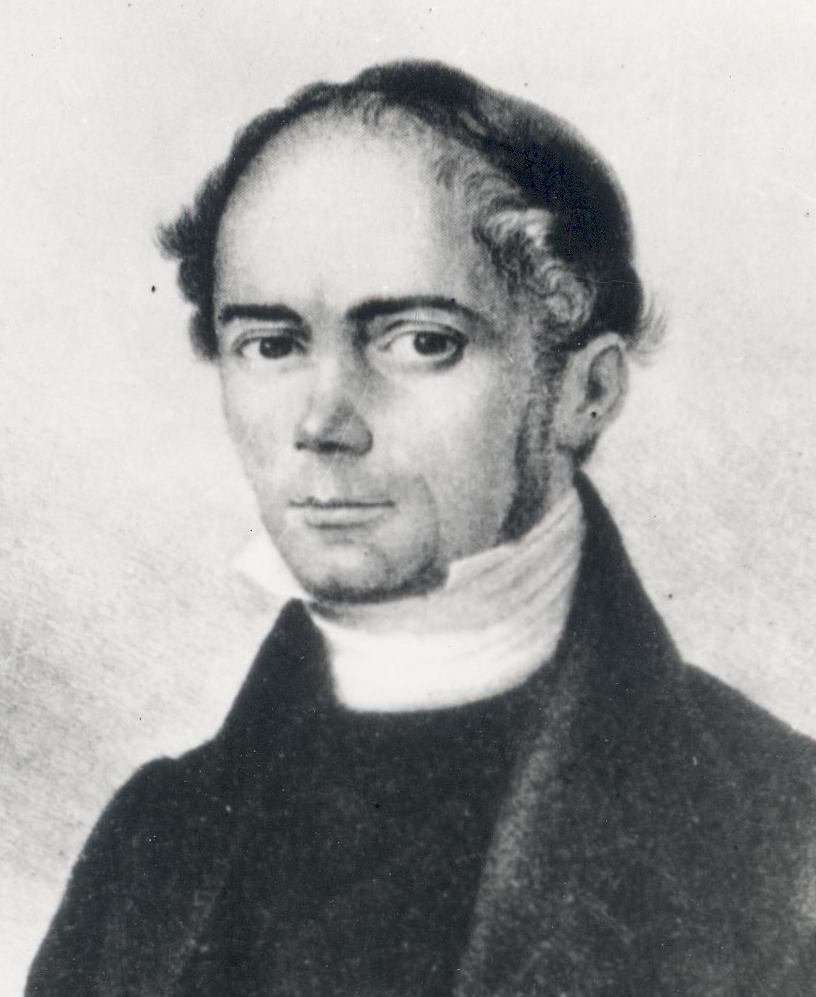
Friedrich Robert Faehlmann
About Friedrich Robert Faehlmann
Friedrich Robert Faehlmann (31/20. XII 1798 – 22/10. IV 1850) was a researcher of Estonian language, culture, and history. He was of Estonian origin. Faehlmann studied medicine and earned his living as a doctor until the end of his life. In the second half of his life, however, he became one of the most important local estophiles to contribute to the appreciation of Estonian national culture through his academic research and the creation of his original fiction.
Faehlmann was born in Järva County in Koeru, the son of the seneschal of Ao Manor. He acquired his general education at Rakvere County School from 1810–1814 and Tartu Governorate gymnasium from 1814–1817. Faehlmann studied at the Faculty of Medicine at the University of Tartu from 1817–1827 and graduated as a Doctor of Medicine; he worked as a doctor in Tartu and its surrounding areas starting from 1824.
While studying at the university, Faehlmann became interested in the Estonian language, and from 1842 until his death, he worked as a lecturer of Estonian language at the University of Tartu. Faehlmann played an important role in the establishment and management of the oldest Estonian academic association, the Learned Estonian Society (Gelehrte Estnische Gesellschaft); he was chairman from 1843–1850. As a linguist, Faehlmann researched Estonian orthography and questions pertaining to word alteration and derivation. Based on the prosody of the Estonian language, Faehlmann considered the most suitable form for original Estonian poetry to be runic verse. Perhaps one of Faehlmann’s most important undertakings was the study of Estonian folklore and the introduction of the entire local mythology, taking examples from classical antique mythology, the Finnish epic Kalevala, and Kristfid Ganader’s and Kristjan Jaak Peterson’s Finnische Mythologie. Faehlmann’s original mythical folk tales appeared in German in the proceedings of the Learned Estonian Society in 1840–1852, and the first Swedish translations appeared already in 1842. They quickly gained international recognition (although the first Estonian translations were published only starting from 1866). Faehlmann presented the mythical folk tales as work belonging to Estonian folklore, without emphasizing his authorship.
Already in 1839, in the presentation “Muinaslood” (‘Fairytales’) given at the Learned Estonian Society, Faehlmann introduced one of the giants in Estonian legends about origins of places – Kalevipoeg – as the Estonian national hero. The Estonian national epic Kalevipoeg written later by F.R. Kreutzwald was largely based on Faehlmann’s preliminary work and drafts.
Thanks to his prolific academic activities in the Learned Estonian Society, his original work, and his enthusiastic introduction of Estonian-language culture in the European arena, Friedrich Robert Faehlmann is considered to be one of the most important Estonian cultural heroes and writers of the so-called Pre-Awakening Age.
I. O. (Translated by M. M.)
Selected bibliography
Dr. Fählmann’i kirjad. Koostanud M. J. Eisen. Tartu: Schnakenburg, 1883, 83 lk. [2., täiendatud trükk: ‘Dr. Fählmann’i kirjatööd’, koostanud ja eessõna: M. J. Eisen, Tallinn: Kool, 1921, 135 lk.]
Friedrich Robert Fählmann, Kirjatööde kogu. 1. Toimetanud J. Jõgever. Jurjev: Eesti Kirjandus, 1915, 80 lk. [Kättesaadav: http://www.digar.ee/arhiiv/nlib-digar:107443. 2. trükk: Tartu: Eesti Kirjandus, 1922, 80 lk.]
Faehlmanni ja Kreutzwaldi kirjavahetus. Toimetanud M. Lepik. Tartu: Õpetatud Eesti Selts, 1936, XIII+217 lk. [Kättesaadav: http://www.etera.ee/s/O42eOZpPt8.]
Kogutud luuletused. Kommentaarid: M. Lepik. Tartu: P. Arumaa, 1938, 32 lk.
Müüdilised muistendid. Toimetanud ja saatesõna: K. Taev; tõlkinud ja järelsõna: J. Aavik. Tallinn: Pedagoogiline Kirjandus, 1941, 48 lk.
Müütilised muistendid. Saksa keelest tõlkinud Mart Lepik. Tallinn: Eesti Raamat, 1979, 32 lk. [2. trükk: Tallinn: Eesti Raamat, 1986, 29 lk.]
Muistendid. Koostanud Kristi Metste. Tallinn: Varrak, 2003, 37 lk. [2. trükk: Friedrich Robert Faehlmann, ‘Muistendid’; Friedrich Reinhold Kreutzwald, ‘Paiklikud ennemuistsed jutud’, Tallinn: Varrak, 2014, 99 lk.]
Collected works
Teosed. I. Koostanud Mart Lepik, Eva Aaver, Heli Laanekask, Kristi Metste. Tartu: Eesti Kirjandusmuuseum, 1999, 269 lk. [Tekst saksa ja eesti keeles. Sisu: rahvavalgustuslik ja ilukirjanduslik looming (sh muistendid); tööd, mis puudutavad eesti rahvaluulet ja kirjandust, Õpetatud Eesti Seltsi tegevust ning muid ajastu aktuaalseid küsimusi.]
Teosed. II. Koostanud ja eessõna: Kristi Metste; tõlkinud Siret Rutiku, Marju Lepajõe, Kristi Metste. Tartu: Eesti Kirjandusmuuseum, 2002, 363 lk. [Tekst saksa keeles, tõlge eesti keelde. Sisu: kaheksa keeleteaduslikku ja kolm meditsiinialast teksti, Faehlmanni doktoriväitekirja sissejuhatus.]
Teosed. III. Koostanud: Kristi Metste, Jaan Undusk, Marju Lepajõe, tõlkinud: Kaarina Rein jt, toimetanud: Kristi Metste, Marju Lepajõe. Tartu: Eesti Kirjandusmuuseum; Tallinn: Underi ja Tuglase Kirjanduskeskus, 2011, 453 lk. [Tekst ladina ja saksa keeles, tõlge eesti keelde. Sisu: ‘Observationes inflammationum occultiorum’ (esmatrükk: Dorpat, 1827), ‘Die Ruhrepidemie in Dorpat im Herbst 1846’ (esmatrükk: Dorpat: E. J. Karow, 1848), ‘Versuch die estnischen Verba in Conjugationen zu ordnen’ (esmatrükk: Dorpat, 1842).]



